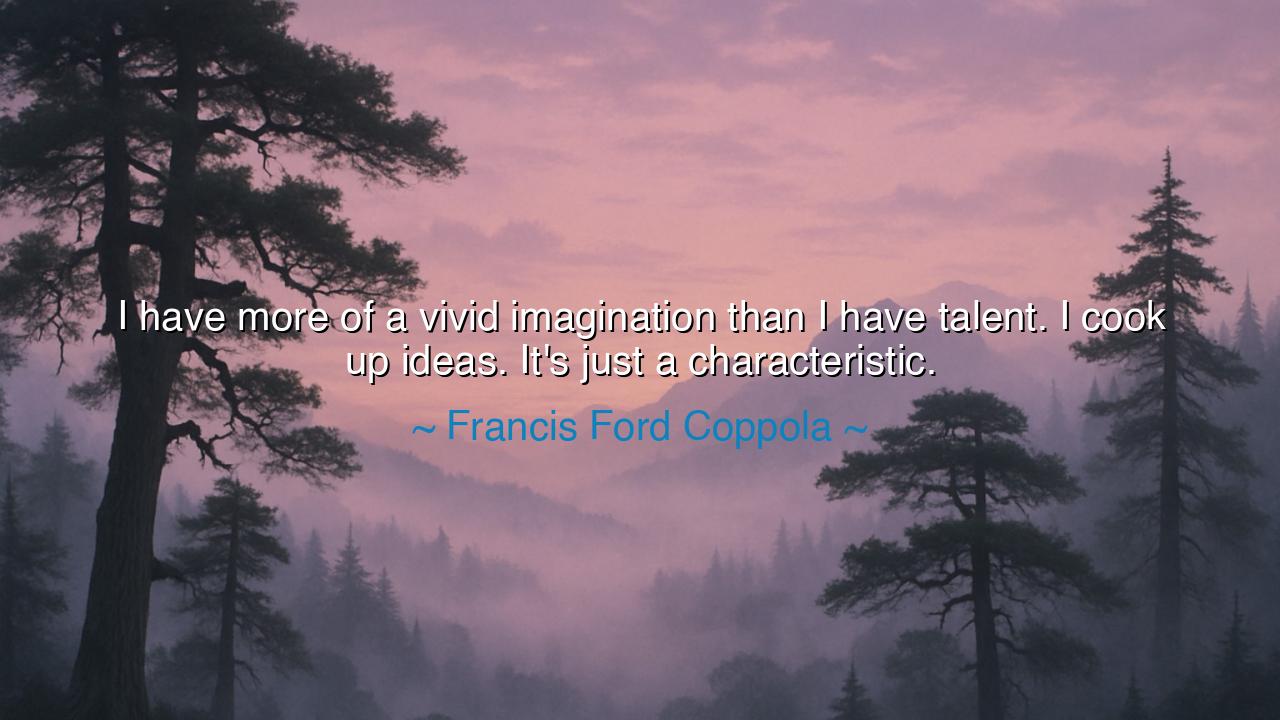
I have more of a vivid imagination than I have talent. I cook up
I have more of a vivid imagination than I have talent. I cook up ideas. It's just a characteristic.






The filmmaker and visionary Francis Ford Coppola, creator of stories that thundered across the screen and into the soul, once confessed: “I have more of a vivid imagination than I have talent. I cook up ideas. It’s just a characteristic.” In this humble admission lies a truth both simple and divine—the truth that imagination, not mere talent, is the source of creation. Coppola, who gave life to The Godfather and Apocalypse Now, understood that the fire of artistry burns not from skill alone, but from the restless spark of the mind that dares to dream, to invent, to imagine beyond what is known. His words are the testament of a creator who saw that genius begins not in mastery, but in wonder.
To say, “I have more imagination than talent,” is to honor the power of vision over perfection. Talent is the tool—the hand, the brush, the instrument—but imagination is the soul behind it. Many have skill, but few have the daring to see beyond the visible, to “cook up ideas” that seem impossible or absurd. Coppola reminds us that creativity is not a polished gift bestowed upon the chosen—it is a living flame, a characteristic that grows through curiosity and courage. The artist, he suggests, is less a master craftsman than a dreamer possessed by visions too vivid to ignore.
From the ancient sculptors of Greece to the inventors of the modern world, this truth has echoed across the ages. Leonardo da Vinci, that eternal student of all things, once wrote that “imagination is the queen of all faculties.” He was not born the most disciplined painter, nor the most consistent craftsman, yet his imagination leapt centuries ahead of his peers. He cooked up ideas of flying machines, of armored vehicles, of human anatomy drawn like divine architecture. His talent served his vision, not the other way around. And though he completed few works, the world still bows before the majesty of his imagination, which saw beyond his own era into the boundless future.
Coppola’s words also speak to the humility of the true creator. The great ones often see themselves as inadequate instruments of their own visions. The sculptor feels that the marble holds more beauty than his chisel can release; the writer senses that the story in his heart is greater than the words he can form. So too did Coppola understand that his strength lay not in perfection, but in possibility—in the restless urge to explore, to experiment, to dare. His confession is not a weakness, but a kind of sacred strength, for it reminds us that creation is not about being flawless, but about being fearless in pursuit of the idea.
And how powerful are those words: “I cook up ideas.” There is something wonderfully human in that image. The artist as a cook in the kitchen of the imagination—mixing flavors of thought, stirring visions, adding a pinch of risk, a handful of madness. Sometimes the dish is perfect; sometimes it fails. Yet the act of creation itself is holy. The cook who never experiments remains hungry for life. The one who dares to “cook up ideas,” even without perfect skill, becomes a magician—turning raw inspiration into nourishment for the soul. Imagination, then, is not only for artists; it belongs to anyone who dreams, builds, or reimagines the world.
Consider how Coppola himself lived this truth. When he made Apocalypse Now, the film nearly consumed him. He faced storms, madness, financial ruin, and despair. Yet through the chaos, it was his imagination that guided him—the ability to see not only what was before the camera, but the deeper vision behind it: the horror and beauty of human nature. He once said the film was not about war, but about “mankind’s heart of darkness.” That insight was not born from technique; it was born from the boundless courage to follow an idea, even when the world called it madness.
So, my listener, take this lesson into your heart: do not wait until you are certain of your talent before you begin to create. Begin instead with your imagination. Trust that small spark, however fragile, for it is the divine seed of all that has ever been achieved. Cook up ideas without fear of failure. Experiment, explore, play. You may not always master your craft, but you will master your spirit—and that is the truest art of all.
For in the end, talent may shape the work, but imagination gives it life. And when your imagination burns bright, even the humblest creation becomes eternal, carrying the breath of your soul into the vast, waiting world.






AAdministratorAdministrator
Welcome, honored guests. Please leave a comment, we will respond soon